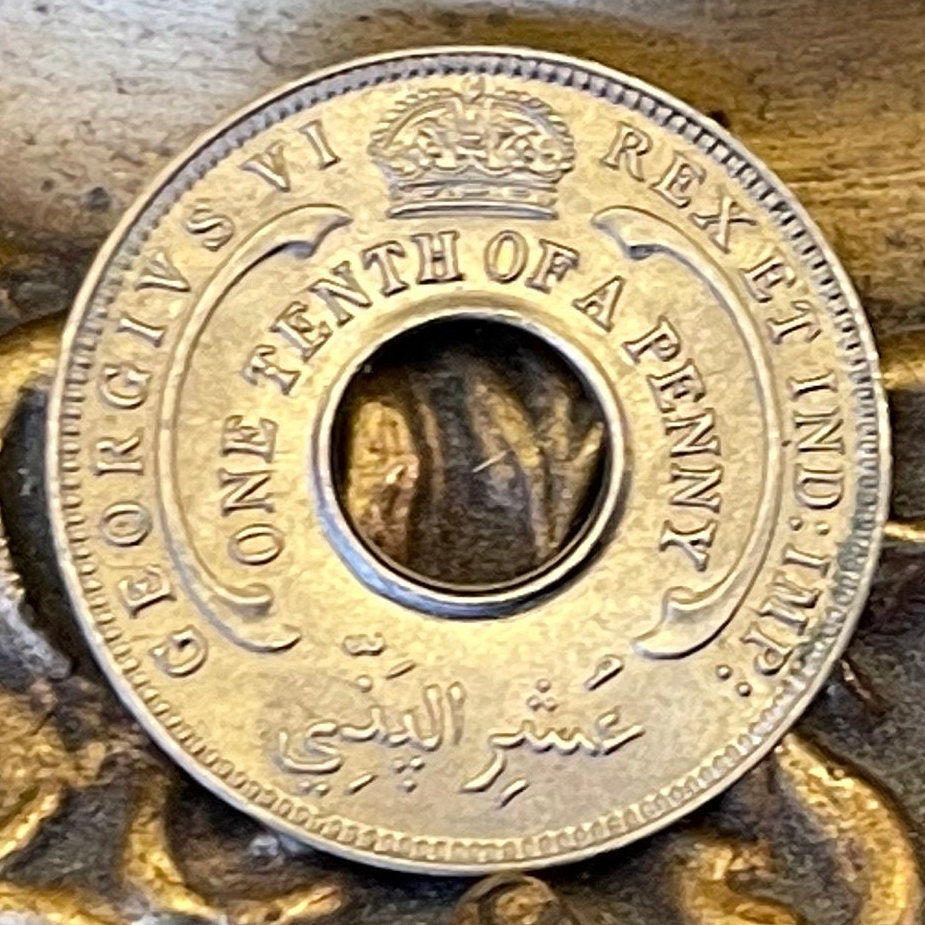elemintalshop
Hexagram Star & George VI Crown with Hole 1/10th Penny British West Africa Authentic Coin Money for Jewelry (King George VI) 6-Pointed Star
Hexagram Star & George VI Crown with Hole 1/10th Penny British West Africa Authentic Coin Money for Jewelry (King George VI) 6-Pointed Star
Couldn't load pickup availability
Hexagram Star with Hole & George VI Crown 1/10th Penny British West Africa Authentic Coin Money for Jewelry and Craft Making (King George VI) (Six-Pointed Star)
Reverse: Six-pointed star (hexagram) around central hole, divided date below
Lettering: BRITISH WEST AFRICA
Obverse: Crown above centre hole, denomination around hole in English, in Arabic beneath.
NOTE: Mintmark (if present) just below hole
Lettering: GEORGIVS VI REX ET IND: IMP:
ONE TENTH OF A PENNY
عُشِر الپَنّي
Features
Issuer British West Africa
King George VI (1936-1952)
Type Standard circulation coin
Years 1938-1947
Value 1/10 Penny (1/2400)
Currency Pound (1907-1968)
Composition Copper-nickel
Weight 1.89 g
Diameter 20 mm
Shape Round with a round hole
Orientation Medal alignment ↑↑
Demonetized Yes
Number N# 10696
References KM# 20
Wikipedia:
British West Africa was the collective name for British colonies in West Africa during the colonial period, either in the general geographical sense or the formal colonial administrative entity. The United Kingdom held varying parts of these territories or the whole throughout the 19th century. From west to east, the colonies became the independent countries of The Gambia, Sierra Leone, Ghana and Nigeria. Until independence, Ghana was referred to as the Gold Coast.
British West Africa as a colonial entity was originally known as Colony of Sierra Leone and its Dependencies, then British West African Territories and finally British West African Settlements. It constituted during two periods (17 October 1821, until its first dissolution on 13 January 1850, and again 19 February 1866, until its final demise on 28 November 1888) as an administrative entity under a governor-in-chief (comparable in rank to a governor-general), an office vested in the governor of Sierra Leone (at Freetown).
The other colonies originally included in the jurisdiction were the Gambia and the British Gold Coast (modern Ghana). Also western Nigeria, eastern Nigeria and northern Nigeria were included.
Africa's present makeup includes Ghana, Sierra Leone, Gambia, Western Nigeria, Eastern Nigeria and Northern Nigeria. Each of these countries and areas are a post-colonial period, or what the Ghanaian writer Kwame Appiah dubs neo-colonialism.
British West Africa's development was solely based on modernization, and autonomous educational systems were the first step to modernising indigenous culture. Cultures and interests of indigenous peoples were ignored. A new social order, as well as European influences within schools and local traditions, helped mould British West Africa's culture. The British West African colonial school curriculum helped play a role in this. Local elites developed, with new values and philosophies, who changed the overall cultural development.
In terms of social issues with British West Africa; sex and race usually conflicted each other (Carina E. Ray called it the "White Wife Problem"). During British West Africa's history, interracial relations were frowned upon, and couples might be discriminated against. There were even certain policies that deported the wives of these relationships back to Britain and denied them access to any of these colonies.[citation needed]
Aftermath
Even after its final dissolution, a single currency, the British West African pound, was in effect throughout the region—including Nigeria—from 1907 to 1962.
Nigeria gained independence in 1960. Sierra Leone was self-governing by 1958 and gained independence in 1961. Gambia gained independence in 1965. In 1954, the British Gold Coast was allowed by Britain to self-govern and in 1957, the Gold Coast was given independence from Britain, under the name Ghana.
Share



















